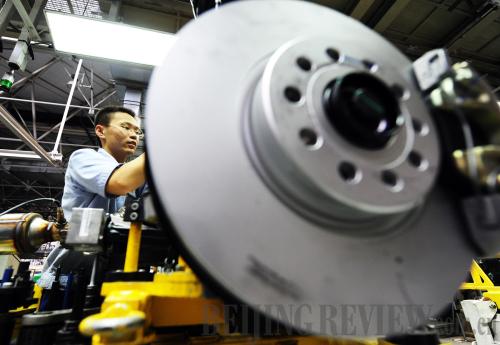|
 |
|
QUALITY IS KEY: A worker assembles car parts on the production line of a FAW-VW Automobile Co. Ltd. factory, a joint venture between China's FAW Group and Volkswagen (XU JIAJUN) |
On January 26 this year, Toyota announced a worldwide recall of 1.7 million vehicles from countries including Japan, the United States, the United Kingdom and Germany, because of vehicle defects that caused fuel leaks. But the world's largest auto market—China's mainland—was not included in the recall.
The General Administration of Quality Supervision, Inspection and Quarantine (AQSIQ), China's consumer product quality watchdog, inquired into the country's absence of the recall, asking Toyota Motor (China) Investment Co. Ltd. to provide an explanation. The meeting did not prompt Toyota to include China in the recall.
A recent report of the U.S. National Highway Traffic Safety Administration said there were 648 auto recalls in 2010 in the United States and more than 20 million cars were recalled.
In contrast, last year China only had 123 recalls that took 1.17 million cars off the road. Meanwhile, of the 123 recalls, imported cars accounted for a larger proportion than domestic cars produced by Chinese-foreign joint ventures. China imported 700,000 cars in 2010, only 4 percent of the total car sales. Of the recalls, 85 were for imported cars, 70 percent of the total.
General Motors sold more cars in China last year than in the United States for the first time in the automaker's history of more than 100 years. Last year, General Motors recalled 4 million cars from auto dealers across the United States. But in China, it recalled 36,509 cars, all of which were imported cars. No cars produced through GM's joint ventures with Chinese companies were recalled.
Since 2004 there have been more than 300 car recalls in China, and almost all luxury brands like Rolls-Royce, Land Rover, Benz, BMW and Lexus, have recall records.
In China, Jetta and Santana cars are the two most popular brands on the road produced by Volkwagen's joint ventures in China, both surpassing 2 million units. However, neither has had to issue a recall.
This was not because cars sold in China are any safer than cars sold in other markets.
Why are automakers afraid of recalling cars in China? A lack of a sound recall system could be one reason, said Jia Xinguang, chief analyst with China Automobile Industry Consulting Co. Ltd.
System defects
The prevailing regulations on car recalls in China are the Provisions on the Administration of Recalling Defective Auto Products issued in 2004. But different from compulsory certification and compulsory recalling in countries like the United States, China follows a model of compulsory certification and voluntary recalling.
"Without legal compulsory regulation, automakers are obviously not going to voluntarily issue recalls," Jia said.
Automakers that try to conceal product defects or delay recalls can be hit with fines between 10,000 yuan ($1,527) and 30,000 yuan ($4,580), amounts that don't add up to much against companies with operating revenues and profits in the billions of yuan in some cases.
High recall costs, which automakers usually have to bear for spare parts and labor, and potential harm to brand image are also deterrents to issuing mass auto recalls. The latter reason holds particular sway in China where consumers assume that only poor quality and unsafe cars, and therefore all cars from a specific brand, are recalled. Consumers in China are also more likely to abandon a brand forever if their newly bought cars are recalled.
Automakers have taken steps to alleviate consumer concerns by providing explanations that the car's overall quality is not faulty, but there are certain safety issues in certain models that need to be addressed right away. Fixing the car now means less problems later and is therefore beneficial to the consumer.
| 